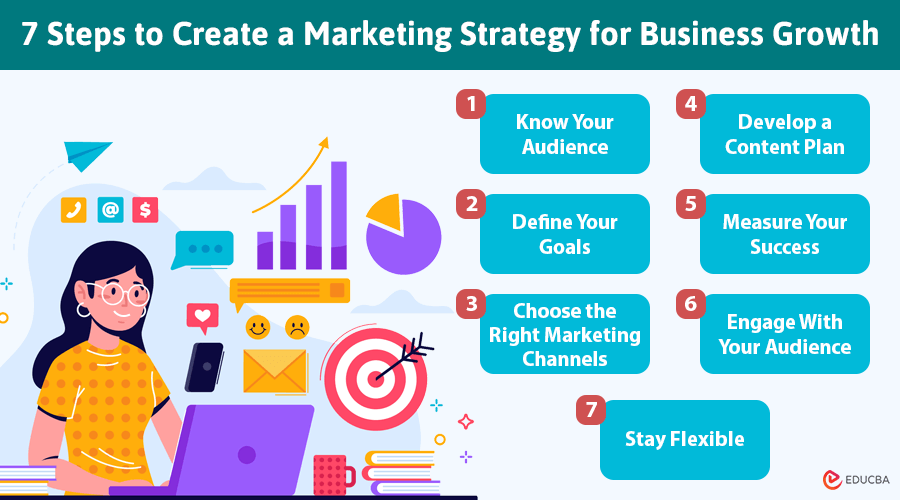Want to Grow Your Business?
Growing a business is not just about offering great products or services—it is about reaching the right people at the right time and in the right way. A carefully developed marketing strategy for business growth is crucial, as it connects your offerings with potential customers. Without a clear plan, even the most exceptional products can fail to make an impact. In this guide, we will look through the steps to develop an effective marketing strategy that drives growth and success for your business.
7 Steps to Create a Marketing Strategy for Business Growth
Follow these key steps to create a marketing strategy to help your business grow effectively.
#1. Know Your Audience
The first step in creating a business marketing strategy is understanding your audience. You are essentially shooting in the dark if you do not know who you are talking to. Begin by defining your target market—consider their interests, where they hang out online, and what problems your product can solve for them.
For example, if you own a coffee shop, your audience might include:https://www.educba.com/french-culinary-schools-embrace-local-cuisine/
- Young professionals working remotely
- Students looking for a study spot
- Retirees seeking a cozy hangout
Each group shares a common need—good coffee and a welcoming atmosphere—but their motivations and preferences may differ. You can better understand their behaviors, interests, and purchasing habits by creating customer personas. This allows you to tailor your marketing to meet their specific needs.
#2. Define Your Goals
Having clear goals is critical in your marketing strategy. Without them, your efforts would not have a clear direction. Be specific about what you want to achieve. For example, instead of a goal like “We want more customers,” aim for something measurable like “We want to increase online sales by 20% over the next three months.”
Ensure that these marketing goals align with your broader business objectives. If your business is still in its early stages, your goal might be building brand awareness. You might aim for customer retention or upselling if you are an established brand.
#3. Choose the Right Marketing Channels
Where you market is just as important as how you market. There are countless platforms and channels. A marketing service like StoryBox recommends combining social media, SEO, email, content marketing, and more. The key is to focus on the channels where your audience spends their time.
For example, if targeting Gen Z, TikTok and Instagram might be your best choices. However, if your audience includes working professionals, LinkedIn could be more effective. Do not spread yourself too thin by trying to be everywhere. Focus on mastering one or two channels initially before expanding. Remember, consistency is key—posting regularly and engaging with your audience helps build trust and keeps your brand at the forefront of your mind.
#4. Develop a Content Plan
Content is the backbone of most marketing strategies. People want value, not just a sales pitch. Design your content to inform, entertain, or solve a problem for your audience. Let us say you own a fitness studio. Instead of only posting promotional content, you could share tips for staying active, recipes for healthy meals, or success stories from your clients. This fosters trust and establishes you as a leader in your industry.
Types of Content to Consider:
- Blog Posts: Ideal for SEO and driving organic traffic.
- Videos: Engage your audience on platforms like YouTube or TikTok.
- Infographics: Share data or simple step-by-step guides.
- Email Newsletters: Keep your audience updated on promotions and new content.
#5. Measure Your Success
How do you know if your strategy is working? You can determine what works and where to adjust by monitoring the right metrics.
Standard metrics to track include:
- Website Traffic: Is the number of visitors on your site increasing?
- Conversion Rate: Are visitors completing desired actions (e.g., signing up or purchasing)?
- Engagement: Are your audience members interacting with your content (e.g., likes, comments, shares)?
Concentrate on metrics that go with your business objectives. Avoid getting distracted by vanity metrics like follower count, which may not always reflect real success.
#6. Engage With Your Audience
Building relationships with your audience is as crucial as initially attracting them. Do not just post content and disappear—engage with your followers. Respond to comments, answer questions, and join conversations in your niche.
Think of your marketing strategy like dating. If you only talk about yourself and never listen, the relationship will not last. But they will likely stick around when you show genuine interest in your audience. Even replying to Instagram DMs can turn occasional customers into loyal fans. It is not always about big gestures—sometimes, the little things make the biggest difference.
#7. Stay Flexible
The digital marketing landscape is constantly evolving. To maintain an effective marketing strategy, you must stay flexible and ready to adapt. Review your strategy regularly and be open to making adjustments.
For instance, if a platform like Facebook is no longer as effective for your target audience, consider shifting focus to newer platforms like Instagram or TikTok. Remaining adaptable helps you stay ahead of the curve and maintain the effectiveness of your strategy as trends change.
Final Thoughts
A marketing strategy for business growth is not just about getting more customers—it is about creating meaningful connections that lead to sustained business growth. Begin by understanding your audience, defining clear goals, and choosing the most suitable channels. Develop valuable content, track your success, and engage with your audience to build long-term relationships. A well-crafted marketing strategy evolves alongside your business and its customers. By following these steps, you will be on your way to creating a powerful, growth-driven marketing strategy for your business.
Recommended Articles
We hope this guide on Marketing Strategy for Business Growth provides valuable insights into how targeted marketing can drive success and expand your reach. Check out these recommended articles for more tips on implementing effective marketing tactics to scale your business.



